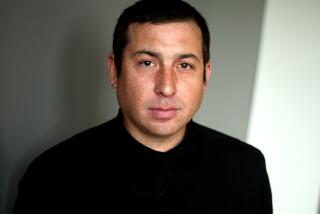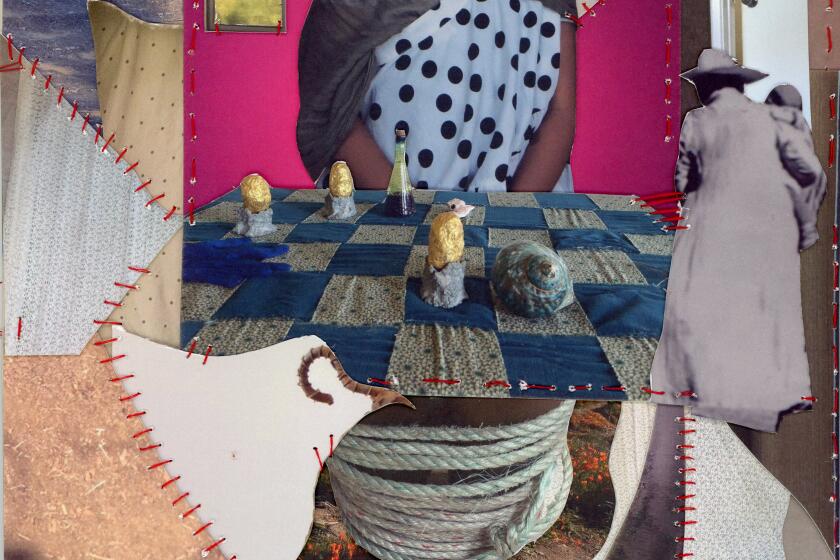‘We Are Now Beginning Our Descent’ by James Meek
We Are Now Beginning
Our Descent
A Novel
James Meek
Canongate: 296 pp., $24
THE TITLE is also the theme. “We Are Now Beginning Our Descent,” the announcement made near the end of an airline flight, stands, in James Meek’s new novel, for the power and lofty presumption of the West as it loses altitude and comes ignominiously to ground among the long-ignored and newly unstoppable hungers and angers of the Third World.
Adam Kellas, the narrator, is a would-be novelist who makes a reluctant living as a journalist. After Sept. 11, his London paper sends him to Afghanistan, where he covers the Northern Alliance forces fighting the Taliban. There he falls in love with Astrid Walsh, a nervy, unpredictable American magazine writer.
They sleep together at an Alliance outpost; then an incident traumatizes them both. She climbs into a tank to watch the gunner practice on a tree trunk; meanwhile Adam has incautiously asked the Afghan commander why he doesn’t fire on the Taliban truck convoys passing nearby. Why kill the drivers? the commander demands (a wonderful instance of the world’s American-eluding ambiguities); soon they may be driving for him. But the question has challenged his honor, and he orders the tank gunner to fire at one of the trucks. A driver and his helper are incinerated.
The two journalists are in anguish: Suddenly they are participants. But Meek’s point is that they have been all along and that their privileged status as observers is a lie. As Astrid demanded earlier of Adam: “What do you think you’re doing here? You’re looking for where the war’s at. You’re selling it. That’s enough. You’re in it. You’ve joined.”
The theme broadens. It is not just journalists who pretend to an antiseptic distance. It is also the way American power tries to project itself (though 4,000 dead U.S. military personnel in Iraq show this to be an illusion). Adam, irascible, near breakdown, is the author’s voice: “The pilots had seen what they did from afar. They could not land. There had always been the distance. America reached out for thousands of miles and its sense of touch stopped three miles short. It threw the bombs, and pulled away again.”
And this same illusory remove is how the world’s comfortable societies insulate themselves -- politically, mentally and emotionally -- from the universe of the deprived.
The theme is developed through the rest of the novel, with an effect sharper than its procession of arranged events. Each of these is designed as a separate stage of purgation, in different ways, for Adam and Astrid. The result is to strip away the last shreds of invulnerability that seemed to differentiate them from the helpless sufferers of Afghanistan and, at the end, of Iraq.
Astrid quits her job and disappears; Adam, devastated, fails to trace her, quits as well and returns to London. There he erupts violently at a dinner party that Meek sets up as a freak show of corrupt Western complacencies. To demonstrate to his smug, fashionably leftist host how Afghan lives are smashed, Adam smashes up the tableware; to show how the inmost intimacies of such lives are violated he reveals his best friend’s adultery to the man’s wife. It’s a set piece but edgily and graphically written -- a tour de force, even, of a peculiarly British social nastiness.
Adam’s purging continues. He gets a huge advance for a potboiler -- in which Europe is depicted as banding together to fight American atrocity -- only to lose it when the publisher is bought out and the book is canceled. (It’s as bad to profit from denouncing a juggernaut, the lesson goes, as from flapping journalistically along in its wake.)
He traces Astrid to a refuge on Chincoteague, off Virginia’s Eastern Shore; there he finds her wracked by her own demons. Painfully, without illusions -- and without the author’s having provided the living inward structure for such a change -- they begin a melancholy and illusionless kind of rebuilding.
Meek manages some compelling observations. He has a wicked insight into the insecurities of foreign correspondents. (I was one. I know.) A fellow journalist tells the self-doubting Adam: “You’re a good reporter, but you were short of staying power. You were the opposite of those TV reporters who think that because they’re somewhere, that place must be where the story is. Wherever you were, you were sure that place wasn’t it. Whatever it was, it was somewhere else.”
The theme of the West’s (and journalism’s) distanced overflight of the rest of the world is an arresting one, richly written and cleverly developed. But like a Strasbourg goose force-fed for its liver, the organic growth and movement a novel requires are forced into distortion and bloat. What the characters stand for is interesting, but often they hardly stand at all. They are stood; they are moved about. *
More to Read
Sign up for our L.A. Times Plants newsletter
At the start of each month, get a roundup of upcoming plant-related activities and events in Southern California, along with links to tips and articles you may have missed.
You may occasionally receive promotional content from the Los Angeles Times.






